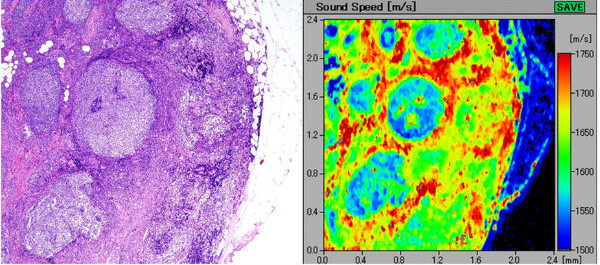
Copanlisib Approved for Follicular Lymphoma
October 16, 2017, by NCI Staff
The Food and Drug Administration (FDA) has granted accelerated approval to copanlisib (Aliqopa™) for the treatment of patients with follicular lymphoma, a form of non-Hodgkin lymphoma (NHL).
The approval covers the use of copanlisib in patients with advanced follicular lymphoma that has returned after at least two prior systemic treatments.
FDA typically bases its accelerated approvals on data from early-stage clinical trials that strongly suggest that a therapy can improve outcomes in a disease for which there is an unmet need.
In the case of copanlisib, the accelerated approval was based on results from a nonrandomized clinical trial—funded by the drug’s manufacturer, Bayer—that tested the drug in patients with different types of NHL. Among the patients in the trial who had follicular lymphoma, approximately 60% had at least partial reductions in their disease (partial response).
“Follicular lymphoma has been a cancer where drug development has really lagged compared to some other cancers,” said Brad Kahl, M.D., who directs the Lymphoma Program at the Siteman Cancer Center in St. Louis. “So, we’re definitely happy to have another option for our patients in the clinic.”
Second FDA-Approved PI3K Inhibitor
Follicular lymphoma is less aggressive than many other forms of NHL. Although most patients respond well to available treatments, the disease often returns. For these patients, effective therapeutic options are limited.
Researchers have been intensely studying a family of enzymes known as PI3 kinases (PI3K) that are part of a critical cell signaling pathway that plays a key role in NHL, including follicular lymphoma, explained Mark Roschewski, M.D., of the Lymphoid Malignancies Branch in NCI’s Center for Cancer Research (CCR). Several drugs that target these enzymes, known as PI3K inhibitors, are being tested in clinical trials.
In 2014, FDA approved the first PI3K inhibitor, idelalisib (Zydelig®), to treat patients with relapsed follicular lymphoma. Copanlisib is now the second approved PI3K inhibitor.
Although both drugs target PI3K, they have some important differences. The drugs’ chemical structures are different, and whereas idelalisib primarily targets a single type, or isoform, of PI3K enzymes, copanlisib targets several different isoforms, Dr. Roschewski said.
No head-to-head trials comparing the two drugs have been conducted. But based on the available data, Dr. Kahl said, the clinical efficacy of the two drugs in patients with follicular lymphoma “looks to be pretty comparable.”
Some Complete Responses with Copanlisib
In the trial on which FDA’s approval was based, more than 100 patients had follicular lymphoma. Of the nearly 60% of these patients whose disease responded to the treatment, approximately 14% had a complete response, meaning their cancer disappeared entirely.
The median duration of tumor responses was just over a year.
The most common serious side effects among patients in the trial were high blood sugar (hyperglycemia), high blood pressure, and lung infections. Other notable but less frequent side effects included declines in white blood cell counts and diarrhea.
Nearly three-quarters of patients had to delay treatment temporarily because of side effects, but these delays were short lived in most cases. About one-quarter of patients had to reduce the drug dose.
Choosing Idelalisib or Copanlisib
Which of the two drugs a patient should get will often come down to patient-specific factors, said Christopher Melani, M.D., also of CCR's Lymphoid Malignancies Branch.
For example, Dr. Melani explained, the drugs are administered in different ways. Copanlisib is an intravenous drug that is administered once a week for 3 weeks, followed by one week off, until the cancer stops responding to the therapy, whereas idelalisib is a pill that is taken daily.
“Intravenous medications are always challenging because patients have to come in [to the clinic] to get them,” he said. “So, there is that trade off.”
The drugs also have different side effects, Dr. Kahl noted. In part because it’s an oral drug, idelalisib can have serious gastrointestinal side effects, including colitis and severe diarrhea, he explained.
Copanlisib, as an IV medication, largely bypasses the gastrointestinal system. But because it can cause hyperglycemia and hypertension, it might not be the best option for patients with diabetes or high blood pressure, Dr. Melani said.
There has been progress in developing predictive biomarkers—molecular alterations that clinicians can test for and that can help to determine whether a patient will respond to a treatment—in several cancer types.
But in the case of follicular lymphoma, the development of predictive biomarkers “is a big unmet need,” Dr. Kahl said. “Unfortunately, with follicular lymphoma, we don’t have that for any drug.”






















.png)









No hay comentarios:
Publicar un comentario